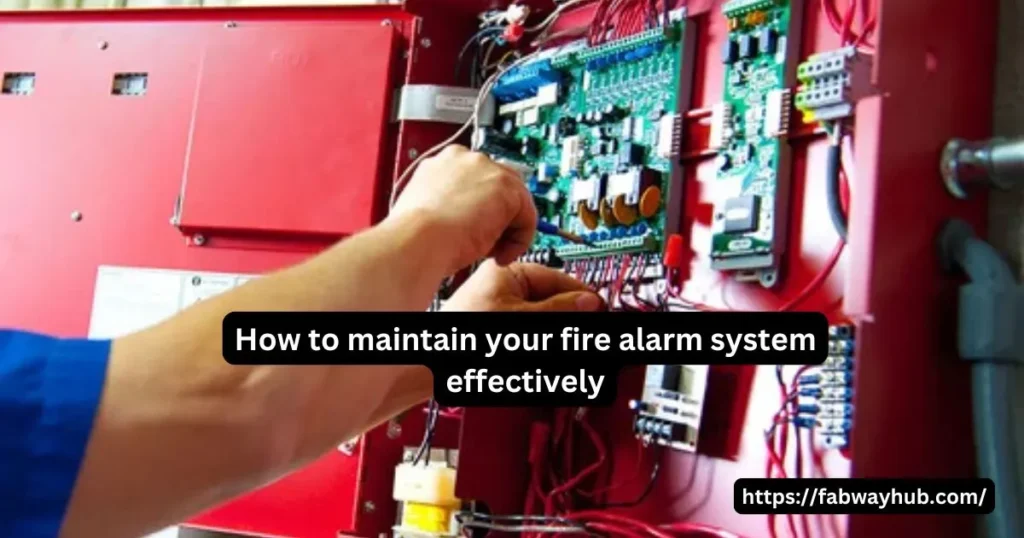Introduction
It is the fire alarm systems that save lives and property, the unsung heroes of safety. They’re also critical early warnings, giving you valuable time to act in an emergency. But as with any system, regular maintenance is required to remain effective. It could cause malfunctions or failures when you need them most. By following the best practices outlined in this guide, you can ensure your fire alarm system stays in good condition and meets all necessary regulations.
Table of Contents
Fire Alarm System Overview
Fire alarm systems comprise a series of interconnected systems that operate together to warn you of possible fire hazards:
- Smoke Detectors: These detect the presence of smoke in the air, often the first sign of fire.
- Heat Detectors: These work by detecting temperature changes and are useful in environments prone to false positive readings from smoke detectors.
- Control Panel: The system’s brain, the control panel processes signals from detectors and activates alarms.
- Alarm Devices: Sirens, strobe lights, and other devices provide audible and visual warnings.
- Redundant Power Supply: Keeps the system operational in the event of a power failure.
How Fire Alarm Systems Work
Fire alarm systems are divided into three main phases:
- Phase 1: Detection Sensors detect smoke, heat, or flame.
- Incident Notify Phase: The system initiates alarms and emergency lights persisting alerts to the occupants.
- Link to Protocols: Lots of systems are wired to sprinklers or the fire department for quick action.

The Advantages of Keeping Your Fire Alarm System Well-Maintained
Keeping Things Running Smoothly
An optimally functioning system ensures fast detection to minimize damage to lives and properties.
Minimizing False Alarms
Routine maintenance fixes faults that can set off false alarms, which are both disruptive to daily life and create complacency.
Fulfilling Legal and Insurance Obligations
Well-maintained systems are often a legal necessity and are sometimes required for insurance claims to be honored.
Extending System Lifespan
Preventive maintenance keeps the parts and pieces of your system healthy, postponing the day you’ll need to buy an expensive replacement.
Essential Steps in Maintaining Fire Alarms
- Regular Visual Inspections
- Look for any visible damage or tampering.
- Check for dust or debris around detectors, which can make them less sensitive.
Testing System Components
- Conduct monthly tests of smoke and heat detectors.
- Set alarms to be loud and visible.
- Check backup batteries to ensure they are holding a charge.
Cleaning and Servicing
- Use a vacuum or soft brush to clean detectors.
- Change the batteries every year or as required.
- Replace expired or defective parts quickly.
Documentation and Reporting
- Log all inspections, maintenance and repairs. Take any needed issues to a professional to pursue the next steps.
- Mistakes in Fire Alarm Maintenance (and How to Avoid Them)
Neglecting Regular Checks
- Not having an inspection on your system, leaves you uninformed of faults until the late end.
Ignoring Minor Faults
- Nothing major, but clearly not something that fixes itself, like a chirping detector.
Ignoring Professional Servicing
- DIY maintenance has its place, but professional inspections can provide a depth of evaluation that amateurs can’t deliver.

Improper Management of Maintenance Records
- Such accurate documentation won’t just help your system remain compliant with the regulations but also provide historical records to assist when maintenance is required.
- By professional services, we mean those companies that provide fire alarm repairs, professional services, and so on.
When to Call a Professional
- For yearly inspections or certificates.
- To fix complicated faults or replace old systems.
How to Select an Honest Service Provider
- Seek out certified technicians with proven experience.
- Customer reviews and testimonials should be read as well.
- Ensure they have warranties or service guarantees.
DIY Maintenance Tips
- Monthly Maintenance Tasks
- Conduct tests on alarms to make sure they operate appropriately.
- Inspect batteries and replace if they are no good.
- Seasonal Adjustments
- During some times, senses may go off, for example when the heaters are used, please adjust sensitivity of detectors.
Testing During Emergencies
- Conduct fire drill practices to ensure that during real-life scenarios alarms and protocols work effectively.
- In-depth guides for fire alarm maintenance tools and equipment
The Essential Tools for DIY Maintenance
- Step ladders to get to detectors.
- Testing aerosol sprays for smoke detectors.
Note: I did not include microfiber cloths and vacuum cleaners.
Insurance Policy Compliance
- That could be a condition of your insurance being valid: to have a working fire alarm system.
- Attend to Training and Education
Training for Homeowners
- Learn how to do basic maintenance and read the manual for your system.
Fire Safety Training In The Workplace
- Staff training should encompass both fire alarm systems as well as emergency response procedures.

Conclusion
This is why it’s not just suggested—you should do fire alarm maintenance. Regular servicing, testing, and cleaning ensure your system is working when you need it the most. With both do-it-yourself help and professional assistance, proactive home maintenance can help save lives and property. Check your fire alarms today!
FAQs
Testing Fire Alarms: How Often should they be Tested?
Check your fire alarms once a month to make sure they work.
What do I do about a beeping fire alarm?
If the problem continues, check and change the battery, clean the detector or seek professional help.
Is it possible to clean my fire alarm system myself?
Yes, a vacuum or soft cloth will handle basic cleaning, but leave advanced work to the pros.
How do I search for a licensed fire alarm technician?
Do your homework: Search online reviews, solicit recommendations and check certifications.
How long is the life of a fire alarm system?
With adequate maintenance, the majority of systems have a 10–15 year lifespan.